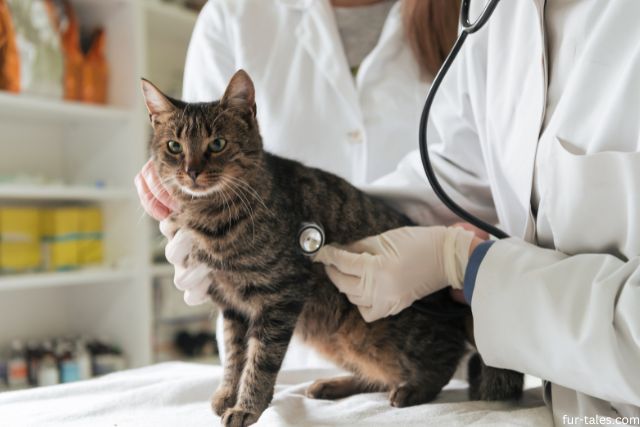
7 Common Causes of Kidney Disease in Cats
Kidney disease is a prevalent health issue in cats, particularly as they age. The kidneys play a vital role in filtering waste, balancing fluids, and regulating essential minerals. When they begin to fail, toxins build up in the bloodstream, leading to serious health problems.
Understanding the causes of kidney disease can help cat owners take preventative measures and recognize the early signs of trouble. Here are seven common causes of kidney disease in cats.
1. Aging and Chronic Kidney Disease (CKD)
As cats get older, their kidneys naturally wear down. Chronic Kidney Disease (CKD) is a progressive condition that occurs over time, often affecting cats over the age of 7. The exact cause of CKD isn’t always clear, but it is often linked to gradual tissue damage, inflammation, and reduced kidney function. Since kidney disease develops slowly, regular vet check-ups can help detect early signs and manage the condition before it becomes severe.
2. Dehydration
Cats are notorious for not drinking enough water, especially if they eat primarily dry food. Chronic dehydration puts a strain on the kidneys, making them work harder to filter waste from the blood. Over time, this can lead to kidney damage and an increased risk of kidney disease. Providing fresh water daily, offering wet food, and using pet water fountains can encourage hydration and support kidney health.
3. Toxins and Poisonous Substances
Certain household items and foods can be toxic to cats and lead to sudden kidney failure. Some of the most dangerous substances include:
- Antifreeze (ethylene glycol) – Just a small amount can cause severe kidney damage.
- Lilies – Even licking or ingesting a small amount of a lily plant can cause fatal kidney failure in cats.
- Ibuprofen and other human medications – Over-the-counter painkillers can be extremely toxic to feline kidneys.
- Household cleaners and pesticides – Certain chemicals can cause kidney damage if ingested.
Keeping hazardous substances out of reach and being mindful of household plants can help protect your cat from accidental poisoning.
4. Urinary Tract Infections (UTIs) and Blockages
Recurring urinary tract infections, bladder stones, or blockages can lead to kidney disease if left untreated. When the urinary system becomes inflamed or obstructed, urine may back up into the kidneys, causing damage over time. Male cats, in particular, are prone to urinary blockages, which require immediate medical attention. Ensuring your cat stays hydrated and receives prompt veterinary care for any urinary issues can help prevent complications that may harm the kidneys.
5. High Blood Pressure (Hypertension)
Hypertension, or high blood pressure, is often associated with kidney disease in cats. It can either be a cause or a consequence of kidney problems. High blood pressure damages the small blood vessels in the kidneys, reducing their ability to filter waste efficiently. Since kidney disease and hypertension often go hand in hand, routine blood pressure monitoring is essential, especially for older cats or those with existing health conditions.
6. Genetic and Breed-Related Factors
Some cat breeds have a higher risk of developing kidney disease due to genetic predisposition. Polycystic Kidney Disease (PKD) is an inherited condition commonly found in Persian, Himalayan, and British Shorthair cats. This disorder causes cysts to form in the kidneys, eventually leading to kidney failure. Responsible breeding, genetic testing, and early veterinary intervention can help manage inherited kidney conditions.
7. Infections and Immune System Disorders
Bacterial, viral, and fungal infections can affect the kidneys and lead to disease. Conditions like Feline Infectious Peritonitis (FIP), Feline Leukemia Virus (FeLV), and Feline Immunodeficiency Virus (FIV) weaken the immune system and increase the risk of kidney-related complications. Regular vaccinations, parasite prevention, and maintaining good overall health can reduce the chances of infections that could harm the kidneys.
How to Protect Your Cat’s Kidney Health
While some causes of kidney disease are unavoidable, there are ways to support your cat’s kidney function and reduce risk:
✔️ Provide plenty of fresh water – Encourage hydration to keep the kidneys functioning properly.
✔️ Feed a balanced diet – High-quality wet food can help maintain kidney health.
✔️ Schedule regular vet check-ups – Routine bloodwork and urine tests can detect kidney disease early.
✔️ Monitor your cat’s litter box habits – Changes in urination could indicate kidney issues.
✔️ Avoid toxic substances – Keep harmful plants, chemicals, and medications out of reach.
